READING GROUP 1
Power of Appearances: Origins of Fashion Theory
Fashion studies have grown into an advanced and popular branch of social science and humanities. Reading group participants will be introduced to texts dating from the second half of the eighteenth century to the first half of the twentieth century, the period when contemporary theory of fashion was just beginning to take shape. Driving from such ‘proto-fashion’ perspective, new ways of looking at the state of ‘post-fashion’ will be found. Principal texts, from the likes of Diderot and Kant to Georg Simmel—the first widely-recognized fashion scholar—will be instrumental in revealing anthropological constants lying at the basis of ‘fashionable behavior’ and trace its changes in the conditions of contemporary Western culture.
Moderator: Ksenia Gusarova—PhD in Cultural Studies, researcher specializing in practices and ideas of the body. Currently lecturing at the School of Advanced Studies in the Humanities at the Russian Presidential Academy of National Economy and Public Administration under the President of the Russian Federation and Moscow School of Social and Economic Sciences. Her texts have been published in magazines, such as Teoria Mody, Neprikosnovenny Zapas, Etnograficheskoe Obozrenie, Journal of Design History, and Clothing Cultures.
READING GROUP 2
Spectator in Contemporary Theatre: Agreement Drafts
Participants will be offered the chance to study relationships between performer and spectator in contemporary theatre. A text that re-defined the discourse was an article by Jacques Derrida ‘The Theatre of Cruelty and the Closure of Representation’, affirming the right of a spectator to act as an interpreter of a spectacle-text. During the group meetings, participants will discuss changes that have taken place in theatre practices since Derrida’s article was published, ways in which the spectator’s role has transformed and attempts undertaken by directors (such as Heiner Goebbels, Rimini Protokoll theatre collective and others) to take over an initiative from their predecessors in the fight for freedom of a spectator.
Moderator: Valery Zolotukhin—PhD in Art History, theatre historian. He is senior researcher at the Research Laboratory for Historical and Cultural Studies at the RANEPA School of Advanced Studies in the Humanities
READING GROUP 3
Between a Word and an Image: Sensation, Affect, Body. New Research Merging Humanities and Natural Sciences
Present-day research of texts and visual objects is steadily moving outside the boundaries of the conventional twentieth-century approach to humanities with its division of disciplines. Many questions are studied from the perspective that merges literary science, visual studies, history, psychology, and neuroscience. Can we move outside the borders of a word or an image and how do we map the unruly areas of undefinable and unfixable? Reading group participants are offered the opportunity to read texts by proponents of the new ‘bordering areas’ and the critics of such in order to find out how to proceed with the practice related to words and images in the times of all-encompassing blurring of boundaries and new attempts of synthesis.
Moderator: Victoria Musvik—PhD in Philology, researcher specializing in visual studies, art critic. Researcher at the Laboratory of Visual and Cultural Studies at the European Humanities University (Vilnius).
READING GROUP 4
Reality on Screen: Myth or Reality? History of Representation in Cinema
Thanks to the special properties of the technology at its foundation (that is photochemical reaction), cinema has always retained a privileged status as a realistic media, or, in other words, bore particularly close ties with reality. However, what is realism and, even wider, reality reproduced with the means of a movie camera? What gets into the frame and what gets read by a spectator? On whose behalf does a film speak and where exactly does its message get born?
Introduction to classical and ‘heretic’ texts by film theorists—from Dziga Vertov to Jean-Luc Godard, from André Bazin to Jean-Louis Comolli and Jean Narboni, from Russian formalists to British materialists—will help to trace the whole trajectory of realistic method in cinema, from its birth in 1920s–1950s till its crisis in 1960s–1970s and renaissance that began in 2000s and lasts till the present day.
Moderator: Vasily Koretsky—film critic. Editor in-chief of the ‘Cinema’ section at COLTA.RU. From 2004 to 2010 he was an editor of ‘Cinema’ section at Time Out Moscow magazine. In 2014, he curated the DPRK film program at Saint-Petersburg International Media Forum. He currently lectures at School of Cultural Journalism at ‘Pro Arte’ Foundation (Saint-Petersburg).
READING GROUP 5
Female Subjectivity in Contemporary Culture
The concept of female subjectivity emerged in the humanities field relatively late—in the twentieth century. Its emergence is related to the critique of conventional thought, based on implicit perception of a subject as a whole rational Cogito, which is a priori a masculine subject. Reading group participants will study texts, devoted to construction of female gender, alongside works, in which ‘feminine’ is thought of as unrelated to the idea of gender. What is that repressive circle that sets the boundaries for the concept of feminine? What is the dominant bodily regime, that structures and disciplines female subjectivity? What are the possible means for resisting this regime—on the level of everyday experience and on the level of artistic practice?
Moderator: Natalia Busygina—PhD in Psychology. Docent at Moscow State University of Psychology & Education, lecturer at National Research University Higher School of Economics and Moscow Institute of Psychoanalysis. She is author of academic publications on critical studies of subjectivity, ideas of psychoanalysis and poststructural philosophy applied in psychology and social sciences methodology.
READING GROUP 6
Lacan and Contemporary Rationalism
This reading group sessions will be structured around discussion of Jacques Lacan’s essay ‘The Instance of the Letter in the Unconscious, or Reason Since Freud’ with its principal thesis: Freud didn’t deny, but rather ‘shifted’ the rational. Psychoanalysis, notwithstanding a general belief, is not a study of irrational, it finds rational in the areas, where it wasn’t expected to be found in the previous epoch. This new rationalism will constitute a subject matter for discussion.
Moderator: Alexander Bronnikov is practicing psychoanalytic, a former student of Jean-Michel Vappereau. He is co-leader of the seminar on Lacanian topology at Russian State University for the Humanities. He completed fellowships at clinical institutions in Paris, took part in the collaborative education program of Université Rennes 2 (France) and Moscow State University of Psychology & Education.

